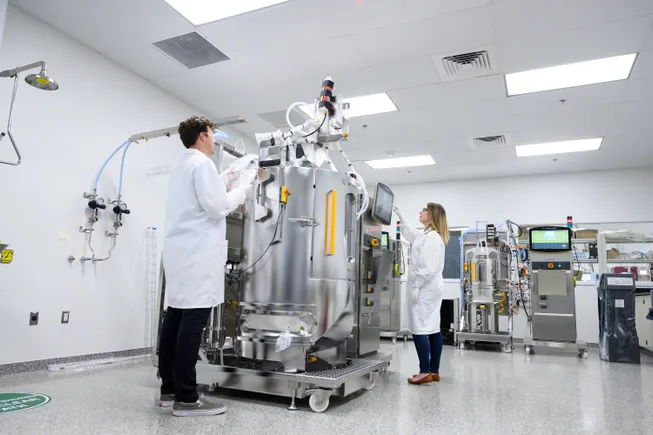Dive Brief:
- UniQure said Wednesday it will ask the Food and Drug Administration next year to approve its gene therapy for the neurodegenerative disorder Huntington’s disease following positive data from a Phase 2 study that showed it slowed signs of disease progression by 75% after three years.
- Though from only 12 patients who’d received the highest tested dose of the therapy, AMT-130, and had been evaluated for at least 36 months, the effects were “greater than what we even anticipated and expected and hoped for,” said Sarah Tabrizi, director of the University College London Huntington’s Disease Center, on a conference call.
- UniQure shares more than tripled on Wednesday, reaching levels they haven’t traded at in more than four years. Alongside the data, the company also announced a debt refinancing with Hercules Capital that will give it access to up to $125 million based on AMT-130’s regulatory progress.
Dive Insight:
Long a pioneering gene therapy company, UniQure has had multiple restarts over the years. The company developed the first gene therapy approved in Europe, Glybera, for instance, but abandoned it after poor commercial performance. It then sold off rights to a hemophilia B gene therapy that’s now on the market, betting instead on a pipeline that’s now led by AMT-130.
AMT-130 is designed to silence a gene that produces a mutant form of a protein called huntingtin that damages nerve cells. Its development hasn’t been straightforward. Trial data released in 2023 suggested that AMT-130’s effects weren’t powerful enough. And while that sentiment has since changed, UniQure, like many other gene therapy makers of late, has been forced to cut jobs and dial back research plans to continue development.
The investment, so far, appears to be paying off. In the trial, UniQure evaluated two different dose levels of AMT-130 in 29 enrollees, and compared their disease trajectory against an external control group similar people involved in a, large longitudinal trial called Enroll-HD. The main goal was an impact on a well-known scale for evaluating the progression of Huntington’s.
The data released Wednesday came from 12 enrollees in the high-dose group who had completed enough follow-up. Those who got AMT-130 saw their scores increase by an average of 0.38 points while the controls increased by an average of 1.52, a statistically significant, 75% difference.
“That means for one year of disease progression, they will have four years longer in terms of disease-free lives,” Tabrizi said on Wednesday’s call. It’s a “huge effect size, and will have massive effects on patients’ lives.”
Treatment was also associated with a 60% slowing of a second measure of progression dubbed Total Functional Capacity. This objective is “seemingly valued by FDA as it was recommended as a [Phase 3] primary endpoint” in another Huntington’s disease trial, she said.
UniQure expects to meet with the FDA by the end of the year to discuss the data before filing an approval application in 2026. The agency has granted AMT-130 two designations that could speed its review and lead to a potential approval by the end of next year.
On the conference call, multiple analysts questioned whether the FDA might grant UniQure a speedier, “accelerated” approval that would require the company to run a confirmatory trial. Company executives said the FDA said it wanted to see the data UniQure revealed Wednesday before making a decision.
Among investors, there is some uncertainty surrounding that future decision because of the presence of Vinay Prasad as the head of the FDA office that regulates gene therapies. Prasad was involved in the brief withdrawal of Sarepta Therapeutics’ Duchenne muscular dystrophy gene therapy Elevidys and, reportedly, skeptical of another Duchenne treatment from Capricor Therapeutics that’s been rejected.
“One investment debate on [UniQure] — and really the gene therapy space broadly — has centered around whether investors can have firm confidence that higher level FDA leadership will be on board with a flexible regulatory approach,” Stifel analyst Paul Matteis wrote in a note to clients.










